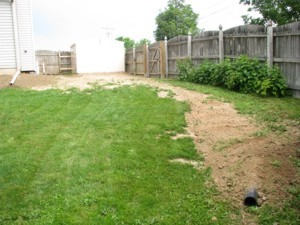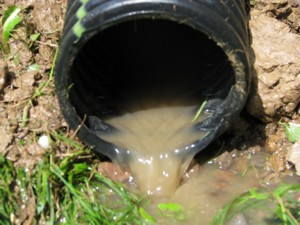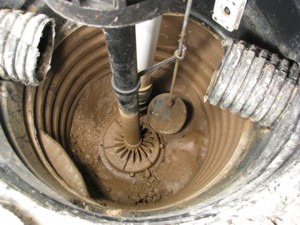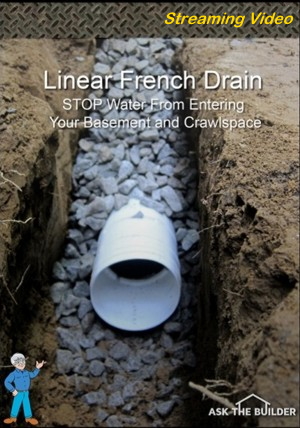Basement Water Leaks
! ! ! See Author's Notes at Bottom of Column ! ! !
DEAR TIM: Hel! Water is pouring through cracks in my basement walls. It happens every spring and during periods of extended rainfall. Are there ways to successfully patch the cracks? Can I apply an interior waterproofing compound? What do you think is causing the problem in the first place? S. T.
DEAR S. T.: I know how desperate you are. I once owned a house where water would actually squirt up through cracks in the floor. Water also streamed through various wall cracks. I was able to solve my water problem. I'm confident that you will too.
Among other things, soil contains air. Except for sandy well drained soils, the greatest amount of air is in the upper two feet of most soils. As you go deeper they become more compact. Clay rich soils can become extremely dense the deeper you go.
When it rains, water fills the void spaces occupied by the air. This water is pulled by gravity both vertically and horizontally through the soil. In sandy soils, the water may drain deeply into the soil. Most clay soils react differently. The water begins to move sideways towards natural springs and creeks. Basements tend to get in the way of this sideways movement.
To make matters worse, the soil around your foundation might have tremendous amounts of air in it. During the original excavation process and the backfilling process this dirt was fluffed up. That is, it became uncompacted. When it was dumped alongside your foundation as backfill, the air was not removed. It can take years before Mother Nature does it naturally. What's more, you may actually have a bowl shaped depression that has formed at the surface that collects rainwater or irrigation water. This depression may be hidden by mulch or gravel.
Check for these low spots. Fill them with well compacted soil. The ground around your foundation should slope away from your house. A 1 inch fall per foot is desirable. Make it slope away for at least 5 - 6 feet if possible. Do not allow downspouts to drain directly onto your soil as well.
There are numerous ways to repair your cracks and waterproof your foundation. The cracks in your walls can be patched with Hydraulic Cement Compounds. These wonderful cements actually expand as they dry. The cracks can be injected with epoxies or polyurethane grouts. Some of these compounds are actually stronger than the original concrete. Some companies inject special crack filling grouts around the outside of your foundation. These compounds react slowly with soil moisture to fill the cracks from the outside. You can also apply cementitious waterproofing compounds by brush on the inside walls.
Prevent leaks in your basement by using this Basement Waterproofing Checklist to hire a great professional. I offer a 100% Money Back Guarantee.
Installing a curtain or linear French drain around the uphill portion of your home will help. This narrow trench contains a perforated drain tile covered with rounded washed gravel. This simple, yet effective device can capture and divert the water before it even becomes a problem.
Author's Notes:
You may wonder if my advice is worth anything. Well, read what Jim Sanders wrote to me when he was at the end of his rope:
"Hi, I just wanted to write to give you the results of my "Trench Drain". I have had a wet crawlspace for 15 years. Water would fill the crawlspace at times, so we actually had to drill weep holes at the base so that it would enter the basement and eventually, the sump pump.
I have tried everything. Several contractors said that the only thing we could do was to bring the water into the house via drainage tile and let it enter the sump pump. That would work, but because I live on a 6' elevation, there is no reason that I should have water problems. It became like clockwork...when it rained, we would rush home from the lake or wherever we were vacationing so that we could be prepared to start the backup generator, in case the power failed. We even had our alarm company put a sump alarm on our system, so they could notify us if we had a power failure. Battery backup was not an option, because sometimes we lose power for days and during any rain, our sump would run every 7 minutes...just like clockwork.
I found your site and read the article on the trench or French drain. At first, it sounded a bit like "holistic healing" to me. I failed to understand why a 2 ft. deep trench, 4 ft. away from the house would do any good. How could this simple thing correct an extreme water problem that has plagued me for years, cracked my foundation, settled my garage floor and ruined almost every vacation?

The Linear French Drain trench running from the house. PHOTO CREDIT: Jim Sanders
I decided "what the heck". I had to dig by hand using a trenching spade and a pick-ax, because the builder back-filled our property with brick and blacktop. It took quite a bit of time. Because the ground level varies so much on that side of the house, I was not able to achieve exactly 2 ft. deep. It varied from 18" to 30" in spots, but the slope was downhill. The trench is about 80 ft. long. At times, I thought about filling it all in, because I just didn’t believe that it would work.
I stoned it, put tile in, and filled it with #1 round stone. I socked the pipe just for safety measure and I also used geotextile fabric on top, so I could cover with dirt and grass. I also ordered some clay and pitched from the house to the drain.

After a short rain, water is running away from the house. PHOTO CREDIT: Jim Sanders
Result? For the last month, we have had 7 or 8 torrential rains, the worst of which was last night. It rained so hard, that our lawn washed out in spots because of the high clay content. Our sump pump, that normally ran every 7 minutes during and after rain, has not turned on for 4 weeks. The silt at the bottom of the sump well is now dry and cracking. Our crawlspace has not shown a trace of water or even moisture.
Since I couldn’t see correcting the foundation cracks or the garage floor settling and tilting until I corrected the problem's source, I waited to see if the trench drain worked first.
This week, I had a company come in and perform sort of a "mud-jacking" technique on the garage floor, which worked perfectly. Also, during the past few weeks, I parged the cracks in the foundation.

A dry sump pump. PHOTO CREDIT: Jim Sanders
I just wanted you to know how this worked. I stressed for many years over this issue and the solution was nowhere near as difficult as I thought it would be.
As a side note, I went to the end of the drain tile during a hard rain to see what was happening. Water was running out of the drain tile in about the same exact volume that it previously ran out of the weep holes in my crawlspace. This winter will be interesting, because last year, the ground next to the house was so saturated that during a thaw, my sump would run constantly. I'm guessing that the ground between the trench and the house will probably be drier now going into this winter."
- Jim Sanders, Upstate area - New York
CLICK HERE to get FREE & FAST BIDS from local drainage expert contractors.
Column 119

2 Responses to Basement Water Leaks